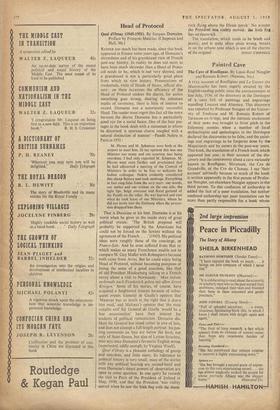Head of Protocol : .
RATHER too much has been made, since this book appeared in France some years ago, of Dumaine's shrewdness and of his grandstand view of French post-war history. In reality he does not seem to have been much shrewder than a Head of Proto- col needs to be, which is not very shrewd, and a grandstand is not a particularly good place from which to view history. Presentations of credentials, visits of Heads of States, official din- ners : on these Occasions the efficiency of the Head of Protocol undoes the diarist, for unless something goes wrong, shaking the inhuman masks of ceremony, there is little of interest to record. Dumaine was a notoriously successful Head. The reader must regret this fact all the more because the diarist Dumaine has a particularly good eye for a social fiasco. One of the best pas- sages in the book deals with a statesman in whom he discerned 'a spurious charm coupled with a natural distinction of manner'—Pandit Nehru in Paris in 1951 : M. Pleven and M. Schuman were both at the airport to meet him. In my opinion this was one Minister too many and our courtesy was being overdone. I had only expected M. Schuman. M. Pleven went even further and proclaimed that he had adjourned a meeting of the Council of Ministers in order to be free to welcome his Indian colleague. Nehru evidently considered this cheap flattery and took umbrage. Everything in fact rang false from the very start : our words, our smiles and our retinue on the one side, the tight lips, beige overcoat and floral garland of the Pandit on the other. He was hurried and curt when he took leave of our Ministers, whom he did not invite into the Embassy when the proces- sion dropped him there.
That is Dumaine at his best. Dumaine is at his worst when he gives us the inside story of great political events: 'The British proposal will probably be supported by the Americans but could not be forced on the Soviets without the agreement of the French . . (1945). His political ideas were roughly those of the concierge, or France-Soir. And he even suffered from that tic which makes so many Frenchmen unable not to compare M. Guy Mollet with Robespierre because both came from Arras. But he could enjoy being Head of Protocol, without becoming pompous or loging the sense of a good anecdote, like that of old President Hindenburg talking to a French envoy about a visit to Normandy : 'Man miisste mehrmals nach Frankreich gehen tnit alien diesen Kriegen.' Some of his stories, of course, have acquired a heightened interest because of subse- quent events. General de Gaulle's opinion that 'Maurras was so much in the right that it drove him mad,' and Malraux's opinion that 'the most suitable end' for General, de Gaulle 'would be a fine assassination' have their interest for students of political romanticism. Dumaine dis- liked the General but stood rather' in awe of him, and does not attempt a full-length portrait: his pas- sing comments on him are below the level, not only of Saint-Simon, but also of Lytton Strachey, who was once Dumaine's favourite English writer (superseded, oddly enough, by Virginia Woolf), Quaff d'Orsay is a pleasant anthology of gossip and anecdote, and little more. Its reference to political history is very small; most of the stories with any political bearing are second-hand and even Dumaine's direct powers of observation are open to some question. In one entry he records the visit to Paris of the President of Ireland in May, 1950, and that the President 'was visibly moved when he saw the Irish flag with the sham- rock flying above the Elysde porch.' No wonder the President was visibly moved: the Irish flag has no shamrock. '
The translation, which tends to be brash and jaunty, and is quite often plain wrong, breaks in on the urbane tone which is one of the charms






























 Previous page
Previous page